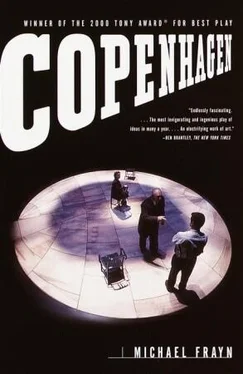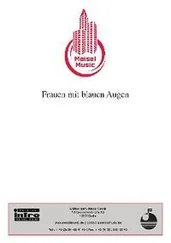The relevance of indeterminacy to quantum mechanics has also been challenged. A version of the famous thought experiment involving two slits has now actually been carried out in the laboratory (at the University of Konstanz). It confirms, as Bohr hypothesised, that while an unobserved particle seems to pass through both slits, so that it forms a characteristic interference pattern on a screen beyond them, any act of observation that attempts to determine which of the two paths the particle actually follows necessarily destroys the phenomenon, so that the interference pattern vanishes. But the experiment appears to suggest that, although the uncertainty principle is true, it accounts for discrepancies far too small to explain the loss of interference. The observation in the laboratory experiment, moreover, was carried out not, as in the old thought experiment, by hitting the particle involved with a photon, which transfers part of its energy to the particle and so alters its path, but by a way of marking with microwaves which has almost no effect on the particle’s momentum.
Some physicists now accept that the loss of interference is caused by a much stranger and less quasi-classical aspect of the quantum world — entanglement. The notion was introduced by Schrödinger in 1935, and suggests that where quantum-mechanical entities become involved with each other (as with the particle and the photon), they form states of affairs which continue to have a collective identity and behaviour, even though their components have physically separated again. The difficulties in this are obvious, but there is no interpretation of quantum-mechanical phenomena that does not involve breathtaking challenges to the logic of our everyday experience.
For the references to all these developments see the bibliography at the end of this Postscript.
*
What about my characters? Are they anything like their originals?
It’s impossible to catch the exact tone of voice of people one never knew, with only the written record to go on, especially when most of what their contemporaries recall them as saying was originally said in other languages. There are also more particular problems with all three of my protagonists.
Bohr, for a start, was as notorious for his inarticulacy and inaudibility as he was famous for his goodness and lovability. He was fluent in various languages, but I have heard it said that the problem was to know which language he was being fluent in. Schrödinger, after his epic confrontation with Bohr in 1926, described him as often talking ‘for minutes almost in a dreamlike, visionary and really quite unclear manner, partly because he is so full of consideration and constantly hesitates — fearing that the other might take a statement of his [Bohr’s] point of view as an insufficient appreciation of the other’s …’ My Bohr is necessarily a little more coherent than this — and I have been told by various correspondents who knew him that in private, if not in public, he could be much more cogent and incisive than Schrödinger evidently found him.
The problem with Margrethe is that there is relatively little biographical material to go on. She and Niels were plainly mutually devoted, and everything suggests that she was as generally loved as he was. She had no scientific training, but Bohr constantly discussed his work with her, presumably avoiding technical language — though she must have become fairly familiar with even that since she typed out each draft of his papers. I suspect she was more gracious and reserved than she appears here, but she plainly had great firmness of character — in later life she was known as Dronning (Queen) Margrethe. She was always cooler about Heisenberg than Bohr was, and she was openly angry about his visit in 1941. According to Bohr she objected strongly to his being invited to the house, and relented only when Bohr promised to avoid politics and restrict the conversation to physics. Bohr himself always refused to be drawn about Heisenberg’s trip in 1941, but she insisted, even after the war, even after all Heisenberg’s attempts to explain, ‘No matter what anyone says, that was a hostile visit.’
The problem with Heisenberg is his elusiveness and ambiguity, which is of course what the play is attempting to elucidate. The one thing about him that everyone agreed upon was what Max Born, his mentor in Göttingen, called ‘his unbelievable quickness and precision of understanding.’ The contrast with Bohr is almost comic. ‘Probably [Bohr’s] most characteristic property,’ according to George Gamow, ‘was the slowness of his thinking and comprehension.’
As a young man Heisenberg seems to have had an appealing eagerness and directness. Born described him as looking like a simple farm boy, with clear bright eyes, and a radiant expression on his face. Somebody else thought he looked ‘like a bright carpenter’s apprentice just returned from technical school.’ Victor Weisskopf says that he made friends easily, and that everyone liked him. Bohr, after their first meeting in 1922, was delighted by Heisenberg’s ‘nice shy nature, his good temper, his eagerness and his enthusiasm.’ There was something about him of the prize-winning student, who is good at everything required of him, and Bohr was not the only father-figure to whom he appealed. He had a somewhat similar relationship to Sommerfeld, his first professor in Munich, and in his difficulties with the Nazis he turned to two elders of German physics for counsel, Max Planck and Max von Laue. His closest friend and colleague was probably Carl Friedrich von Weizsäcker, who was younger than him, but it is striking that during his internment the person he chose to confide his explanation of the Hiroshima bomb to was not Weizsäcker, who was interned with him (although he may well have discussed it with him already), but the 66-year-old Otto Hahn.
The American physicist Jeremy Bernstein says that ‘he had the first truly quantum-mechanical mind — the ability to take the leap beyond the classical visualizing pictures into the abstract, all-but-impossible-to-vizualise world of the subatomic …’ Cassidy believes that a great part of his genius was his ‘ability to adopt a serviceable solution regardless of accepted wisdom.’ Rudolf Peierls stresses his intuition. He would ‘almost always intuitively know the answer to a problem, then look for a mathematical solution to give it to him.’ The obverse of this, according to Peierls, is that ‘he was always very casual about numbers’—a weakness that seems to have contributed to his downfall — or his salvation — in the atomic bomb programme.
Margrethe always found him difficult, closed, and oversensitive, and this propensity to be withdrawn and inturned was exacerbated as life went on — first by his political problems in the thirties, and then by his efforts to reconcile the moral irreconcilables of his wartime work. His autobiographical writing is rather stiff and formal, and his letters to Bohr, even during the twenties and thirties, are correct rather than intimate. Throughout the period of their closest friendship they addressed each other with the formal Sie , and switched to du only when Heisenberg also had a chair.
The conversations that Heisenberg claimed such freedom to recreate in his memoirs are stately. Much more plausibly colloquial is the transcript of David living’s long interview with him for The Virus House , living’s history of the German bomb programme, though he is still (naturally) watchful. In the transcripts of the relatively unguarded conversations that the German atomic team had among themselves during their internment, where Heisenberg emerges as the dominant figure, both morally and practically, a certain hard-headed worldliness can be detected. He is much concerned with professional prospects, and with how they might make some money out of their wartime researches. When one of the others says that if they agree to work on atomic matters under Allied control they will be looked down upon as traitors ‘in the eyes of the masses’, Heisenberg replies: ‘No. One must do that cleverly. As far as the masses are concerned it will look as though we unfortunately have to continue our scientific work under the wicked Anglo-Saxon control, and that we can do nothing about it. We will have to appear to accept this control with fury and gnashing of teeth.’
Читать дальше












